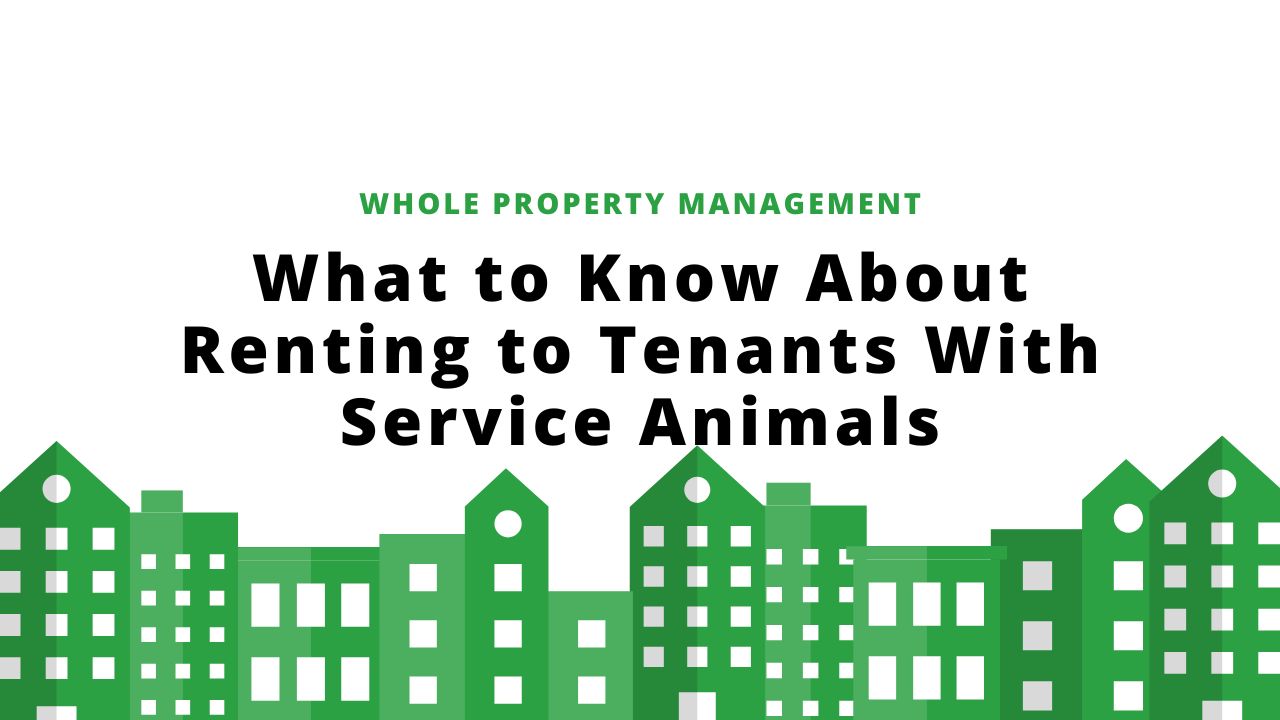What to Know About Renting to Tenants With Service Animals
Key Takeaways
- Reasonable Accommodation is Required: Landlords must allow service animals, even in no-pet properties, under the Fair Housing Act and ADA.
- Service Animals Are Not Pets: They are trained to assist people with disabilities and cannot be charged pet fees or deposits.
- Landlords Can Enforce Rules: If a service animal is aggressive or causes damage, landlords may take action with proper documentation.
Some landlords feel hesitant about renting to tenants with service animals, often because of unanswered questions such as, “What if the animal damages my property?” or “Can I require a pet deposit?”
The truth is, it’s not as complicated as it may seem and there’s no need to be fearful. Ethically, landlords should approach these situations with professionalism, empathy, and transparency. Legally, they are required to provide reasonable accommodations and treat tenants with service animals fairly.
In this guide from Whole Property Management, we’ll cover everything you need to know about renting to tenants with service animals, including legal requirements, expectations, common pitfalls, and best practices.
What is a Service Animal?
According to the Americans with Disabilities Act (ADA), a service animal is a dog that is individually trained to perform tasks for a person with a disability. In some cases, miniature horses that are similarly trained must also be accommodated.
These tasks can vary widely, but examples include:
- Retrieving items for someone with mobility challenges
- Guiding individuals who are blind or visually impaired
- Providing comfort and grounding during a post-traumatic stress disorder (PTSD) episode
- Alerting a person with epilepsy before a seizure occurs
It’s important to clarify that pets are not the same as service animals, and service animals are not the same as emotional support animals (ESAs).

A service animal is trained to perform tasks the renter cannot do for themselves, while an ESA’s role is to provide comfort and emotional support without specific task training.
Different laws govern each category: pets are treated simply as pets, service animals are protected under both the Americans with Disabilities Act (ADA) and the Fair Housing Act (FHA), and ESAs are covered only by the FHA, with no protection under the ADA.
Legal Requirements for Landlords
Even if your property has a no-pets policy, landlords are legally required to make reasonable accommodations for tenants with disabilities. This includes allowing service animals and emotional support animals. These protections come from the Fair Housing Act and Section 504 of the Rehabilitation Act.
In other words, as a landlord, the law does not allow you to:
- Collect pet deposits or pet rents for service animals
- Demand them to produce training documents or certifications for the animal
- Reject renting the property to them because they have a service animal
- Ask for proof to show they are disable
However, you are legally permitted to make the following inquiries;
- Ask to know if the animal is needed because of the disability
- Ask what task or work the animal was trained to handle
Anything outside this may attract legal issues and should be avoided.
Can You Restrict Breed and Size?
Even when your rental property has a pet policy that restricts a particular breed or size of pet, it does not apply when service animals or emotional support animals are involved.

For instance, if your policy said “no dog above 25lbs allowed”, a tenant with a spinal injury that has a Great Dane to help him to walk will be allowed. However, you can deny renting the property to a tenant if you have concrete evidence that the service animal causes serious damage or poses a threat to other people.
Can You Still Charge a Security Deposit?
Of course, security deposits differ from pet deposits. You are legally allowed to charge the normal refundable security deposit for your rental property.
In situations where the service animal causes any damage to your property, it is within your legal rights to deduct money to perform the repairs from that security deposit. This is the same thing you will do for any renter.
What is Reasonable Accommodation?
Landlords are required to provide “reasonable accommodation” for tenants with service animals. But what does that actually mean?
For example, if your rental rules state that “dogs are not permitted in common areas,” this could be considered unreasonable for a tenant with a disability who needs their service dog to accompany them everywhere on the property.
However, you can make it reasonable by;
- Allowing them access those places with their service animals
- Telling them to to ensure that it is leashed and under control
- Requiring that the animal waste be cleaned off (as with other animals)
- Telling them to ensure the service animal does not harass other renters or damage properties.
Addressing Service Animal Issues as a Landlord
While landlords must make reasonable accommodations for tenants with service animals, this does not mean they have no recourse if problems arise.

A tenant may still be held accountable for lease agreement violations if the service animal is aggressive, disrupts other residents, or repeatedly causes property damage.
In such cases, landlords should carefully document each incident, provide written notice to the tenant, and offer an opportunity to address the issue. If the tenant fails to resolve the problem, legal action, including a rental eviction, may be pursued in accordance with applicable laws.
It is also common for other tenants to raise concerns when they see a dog on the property, particularly if a no-pet policy is in place.
In these situations, landlords should explain that the animal is a service animal protected under federal law to assist with a disability, and therefore not considered a pet. Landlords have both an ethical and legal obligation to accommodate such tenants, even in no-pet communities.
How to Handle Service Animal Accommodation Requests
When a tenant submits a request to accommodate a service animal, it’s important for landlords to respond thoughtfully and consistently. Following a clear process not only protects tenants’ rights but also helps landlords stay compliant with the law.
- Maintain Professionalism and Objectivity: Avoid letting bias or misconceptions influence your decisions.
- Use a Standardized Process: Implement checklists or written procedures for reviewing all accommodation requests to ensure fairness and reduce the risk of legal disputes.
- Seek Reliable Guidance: Don’t rely solely on online information — consult your local housing authority or a fair housing attorney for accurate, up-to-date advice.
- Be Consistent and Document Everything: Apply the same rules to all tenants, keep thorough records of requests and decisions, and ensure your process is transparent and uniform.
By following these steps, landlords can effectively manage service animal requests while maintaining a fair and legally compliant rental environment.
Bottom Line
Landlords naturally want to protect their investment properties from damage and maintain their value. At the same time, most tenants with service animals are simply seeking to live their lives with dignity and independence.
The law is designed to protect people with disabilities, not to penalize landlords. It’s important to remember that behind every service animal is a person facing challenges that aren’t always visible, showing extra strength and courage every day.
As a landlord, you have the power to make their experience either more difficult or more supportive. We trust you’ll choose to make it easier. If you want to learn more about how to handle service animal requests fairly and confidently, consult the experts at Whole Property Management today!

